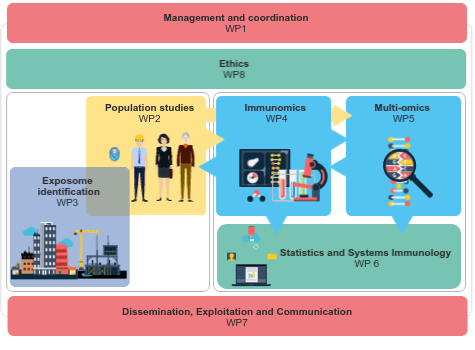Mapping Exposure-Induced Immune Effects: Connecting the Exposome and the Immunome
EXIMIOUS Workplan
The EXIMIOUS project is arranged into 8 Work Packages (WP). WP2-WP6 are dedicated to the scientific research. The dissemination, communication and exploitation of the scientific research results is organized in WP7.. WP8 is dedicated to ensuring that ethical requirements are followed throughout the project, and is of partiucular importance in a project like EXIMIOUS, where personal and clinical data of cohorts is used. The smooth management and coordination of the project is overseen by WP1.

This work package aims to ensure the scientific coordination of the project, including continuous appraisal of the appropriateness and effectiveness of the chosen approach to meet the objectives. This allows the project to envisage and implement, if necessary, potential adjustments to new conditions and/or opportunities.
Work package 2 aims to define the platform to study the exposome/immunome interactions in humans in multiple cohorts. These cohorts (uniquely) span the entire life course, starting at birth, and include general, occupational and disease cohorts. More information about the cohorts.
The overall objective of this work package is to identify and quantify the exposure to specific chemical, biological and physical agents based on modelling (job exposure matrix/environment) or on environmental measurements.
This work package has the objective to study the effects of the chemical exposome on high-dimensional immune cell signatures and soluble proteins, and their relation to specific immune health outcomes. We ultimately aim to discover specific immune signatures/biomarkers related to exposure-associated disease development.
This work package is complementary to WP4 and aims to explore – through a non-targeted approach – the role of genetic background, epigenetics, telomerase length and secretome data. This will allow us to fully describe the immune signature associated with exposure on selected cohorts with the aim of discovering specific immune signatures/biomarkers related to exposure-associated disease development.
Work package 6 seeks to determine the immunological consequences of environmental exposures by integrating the novel high-throughput experimental platforms measuring both exposures (WP3) and immunological outcomes (WP4-WP5). The data will integrate both healthy individuals with occupational exposure, and individuals with diseases known to be triggered by environmental of occupational exposures, allowing us to dissect the primary and secondary immunological consequences of exposures.
The two main objectives of work package 7 are to raise awareness of the EXIMIOUS project and to disseminate and exploit the results achieved.
This work package has the objective to ensure that the ‘ethics requirements’ are fulfilled in all parts of the project. These include ethics requirements of the EU, but also of national law. Thus, each party involved will ensure that its work for EXIMIOUS is fully in line with all applicable local and international laws, regulations and guidelines that are effective during the project period, including those governing health and safety, data protection, and where relevant, the use of human or animal subjects and good clinical practice.